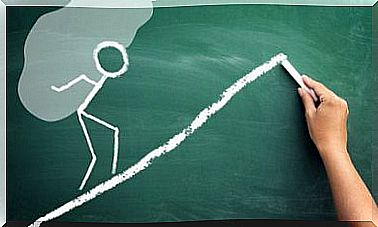Each Of Us Is The Creator Of His Obligations

We are saturated with obligations of all kinds: from those that we have to respect in the workplace to those that belong to the family sphere, such as preparing lunch every day. In this demanding society we live in, we need to be attractive, good workers, always be up to date, be good parents, etc.
How many times have you been forced to do something you didn’t like because that was what you “had to” do? The word duty is part of the great irrational beliefs and implies a hidden need that we must fulfill to be happy, or at least not to feel bad.
Thoughts that speak of obligations
Negative emotions usually originate from an obligation. As cognitive psychology shows us, what we think is the direct cause of how we feel and how we feel affects, in turn, how we think. Based on this, if we are anxious, depressed or angry, we will probably create an infinity of obligations in our mind.

These obligations can spill over into ourselves, others, or the world at large and speak of the false idea of how things should be. These “shoulds” lock the door to emotional well-being: unconditional approval.
We do not accept ourselves as we are, a factor that creates in us insufficient self-esteem, as well as a feeling of anxiety that comes from the desire to fulfill self-imposed expectations or depression in the event that we do not succeed.
“I should have acted correctly in that situation”, “I should have done my job perfectly every day”, “I mustn’t be wrong”… are some examples of negative thoughts we can have when we force ourselves to be who we are not.
The “shoulds” referring to others generate a feeling of anger, as do those referring to the world. Wanting the people around us and life to be in a way that matches our personal criteria is as unrealistic as claiming the sky is fuchsia.
When obligations are on us, we hide the need for approval and perfectionism : “I have to do my job perfectly because I need to be recognized by the company”. However, when we expect others to act in a specific way, this is due to our need for comfort: “There should be no confusion on the street, because it causes me stress, annoyance, I arrive late, etc …”
Change the “should” to “I would like”
If we are able to modify our inner dialogue with one that is more adaptable to the world as it is, we will discover the technology that allows us to be happier. Change, of course, does not have to be merely verbal, but we must believe in what we say and do it to the point that our unhealthy negative emotions become healthy.
All the obligations and “shoulds” that govern our life are imposed by ourselves even if we believe we have no loophole. If we think about it, no one has put a gun on our head forcing us to have the life we lead.

You may be thinking that there are inescapable obligations, such as work or childcare. If we have chosen a specific job and at the same time want to be parents, once again we have imposed on ourselves the obligation. All our actions have consequences and if we want to continue paying the mortgage or for our little ones to become educated people, we will certainly have to act in the direction that produces that result.
In order not to feel obligated and anxious, you have to start changing your inner speech. Whenever a “should” appears in your mind, quickly change it to a “prefer” or “I would like”, without falling into demands. Finally, the “I would like” should be accompanied by a “if it is not the way I want it is not the end of the world” or “if things go this way, I will have other options”.
With the practice and internalization of these “wishes”, we will begin to feel much calmer in this demanding world.









